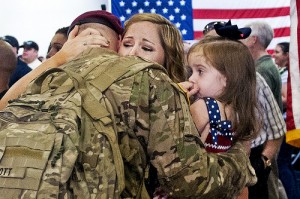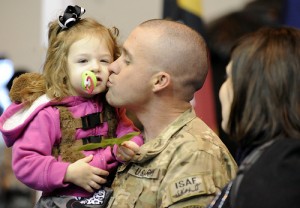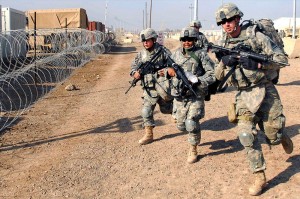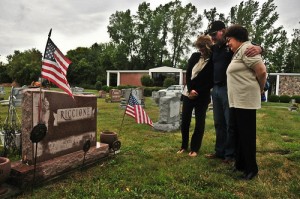The War Within
The Effects of War on Military Personnel and their Families
Do You or a Loved One Suffer from PTSD?
PTSD, or Post-Traumatic Stress Disorder, is defined as an anxiety disorder that affects a person after a traumatic event. The disorder leaves the person affected unable to function in his or her everyday life, and this lasts for longer than one month after the traumatic event. Symptoms may include:
– Flashbacks
– Avoidance
– Sleeping disturbances
– Numbness towards loved ones
– Desire to participate in risky behaviors
– Maladaptive coping skills
– Distancing from loved ones
– Nightmares
– Depression loss of energy
– Aggressive tendencies
– Suicidal thoughts
PTSD is closely related to the loss of fellow comrade or an innocent soul. Soldiers are always surrounded by death while being deployed and it can be hard to accept that death in war is unpreventable.
You’re Not Alone
Substance abuse
In an attempt to deal with the traumatic experiences that veterans are exposed to, many turn to alcohol or illegal substances. Veterans are more likely to engage in risky behavior such as the abuse of alcohol and/or substances than civilians due to the brutal experiences that they face on a normal basis. Substance abuse problems cause many extra stressors on the family including violence, substance abuse in the spouse of the veteran, and crumbling of the family’s structure and function.
Suicide
Military suicide is a harsh reality of war. Suicide is the second leading cause of death among military members. Since Operation Iraqi Freedom, military suicide has risen sharply. By nature, stress contributes to higher tendencies of suicide attempts, and what could be more stressful than living in military combat for extensive periods of time. In 2008 military veterans accounted for 20 percent of the suicide population.
Public awareness is the key to prevention. Anyone experiencing suicidal thoughts can call an anonymous hotline – 1-800-784-2433
All in it Together
Spouses
Marital stress may increase with the return of the soldier suffering from PTSD. It is common for a spouse to have to adopt new roles  in the family and household. Caregiver burden is a common issue among spouses. This is when the veteran’s spouse must take on all the roles of the household as well as taking care of the veteran.
in the family and household. Caregiver burden is a common issue among spouses. This is when the veteran’s spouse must take on all the roles of the household as well as taking care of the veteran.
Spouses must keep watch over their veteran partners, adding stress to their everyday lives. This leads to lower marital satisfaction in veteran couples. Dealing with someone who is frequently angry, emotionally unavailable, and often withdrawn is very difficult. Marriage may become a task and attraction may fade.
To learn more about spouses click here .
Children
PTSD can impact the well being of children in the family severely if left untreated. When a soldier returns home with PTSD, the symptoms of this disorder can often transfer over to the children in a process called “Secondary traumatization”. We know that the symptoms of PTSD can directly influence the behavioral, social, and mental development within a child and continue to impact them throughout their adult life.
 Children also must face seeing their parent performing behaviors that are out of the norm and related to war. Some children do not know how to handle the stress, which makes them push themselves away from their parents in an attempt to relieve or avoid stress. This can lead to problems outside of the home. While pushing away from the veteran, the child establishes a closer bond with the spouse. This can cause the parent with PTSD to feel worthless and withdraw from the family.
Children also must face seeing their parent performing behaviors that are out of the norm and related to war. Some children do not know how to handle the stress, which makes them push themselves away from their parents in an attempt to relieve or avoid stress. This can lead to problems outside of the home. While pushing away from the veteran, the child establishes a closer bond with the spouse. This can cause the parent with PTSD to feel worthless and withdraw from the family.
There is Hope
Overcoming Barriers
Veterans with PTSD often perceive situations through the lens of war and may feel that no one is safe to trust, not even family. Distrust can create tension in the family because veterans do not feel comfortable enough to tell anyone, including spouses, what they are going through and experiencing. He will not report it or seek medical help because of the social stigma related to military men. Majority of people in American society believe that military members are supposed to be tough and rigid, stoic and strong. This stigma places anxiety on veterans and makes them less likely to report. If they do report, they may feel inadequate, or like less of a man.
It is normal for soldiers diagnosed with PTSD, as well as their family members, to feel some sort of embarrassment or stigmatization when seeking out treatment. Veterans with substance abuse problems generally do not realize the serious risks associated with PTSD. It is important to actively seek out information regarding PSTD and treatment options as soon as possible, in order to prevent the symptoms from progressing.
Reaching Out
Communication is key. Communication and a strong social support can prevent a solider from developing depression. The emails and phone calls about life back at home while at war make a difference. Communication allows the solider to know that the family cares and willing to listen. Hearing the stories allows the family to understand why the solider may be different when he/she returns.
The government provides support systems and organizations at the federal, state, and local levels to help veteran families thrive. Individual therapy sessions, couple therapy sessions, and family sessions are examples of resources available for veteran families. Military members are able to discuss what they saw at war and how those experiences are affecting what they are currently feeling. Counseling for the family as well as the veteran is extremely helpful in many cases.
To learn more about counseling at VA/DoD facilities, click here.
References
Blaisure, K. R, A. Saathoff-Wells, Pereira, S. M. Wadsworth, A. L. Dombro (2012). The Effect of War on Service Members. In K. R. Stone, T.Eds.) Serving Military Families in the 21st Century. (pp. 127-129, 132-133). New York, NY: Routledge.
Bryan, C. J.,Cukrowick, K.C., West, C. L., & Marrow, C.E (2010). Combat experience and the acquired capability for suicide. Journal of Clinical Psychology, 66(10) 1044-1056. doi:10.1002/jclp.20703
Dinshtein, Y., Dekel, R., & Polliack, M. (2011). Secondary traumatization among adult children of ptsd veterans: The role of mother-child relationships. Journal of family social work, 14(2), 109-124. doi: 10.1080/10522158.2011.544021
Eaton, K. M., Hoge, C. W., Messer, S. C., Whitt, A. A., Cabrera, O. A., McGurk, D., & … Castro, C. A. (2008). Prevalence of Mental Health Problems, Treatment Need, and Barriers to Care among Primary Care-Seeking Spouses of Military Service Members Involved in Iraq and Afghanistan Deployments. Military Medicine, 173(11), 1051-1056.
Image provided by Flickr user gopal1035 – CC License
Image provided by Flickr user The U.S. Army – CC License
Image provided by Flickr user Defence Images – CC License
Image provided by Flickr user The U.S. Army – CC License
Image provided by Flickr user The U.S. Army – CC License
Image provided by Flickr user The U.S. Army – CC License
Image provided by Flickr user The U.S. Army – CC License
Image provided by Flickr user The U.S. Army – CC License
Jakupck, M., Cook, J., Imel, Z., Fontana, A., Rosenheck, R., & McFall, M. (2009). Posttraumatic stress disorder as a risk factor for suicidal ideation in Iraq and Afghanistan War veterans. Journal of Traumatic Stress, 22(4), 303-306
Kaplan, M. S., McFarland, B. H., Huguet, N., & Newsom, J. T. (2012). Estimating the risk of suicide among us veterans: How should we proceed from here? . American Journal of Public Health, 102(S1), s21-s22. doi: 10.2105/AJPH.2011.300611
Manguno-Mire, G., Sautter, F., Lyons, J., Myers, L., Perry, D., Sherman, M., Glynn, S., & Sullivan, G. (2007). Psychological distress and burden among female partners of combat veterans with ptsd. Journal of nervous & mental disease, 195(2), 144-151. doi: 10.1097/01.nmd.0000254755.53549.69
Monson, C.M., Fredman, S.J., & Riggs, D.S. (2012). Posttraumatic Stress Disorder and Its Comorbidities. In D. Snyder & C. Monson (Eds.), Couple-Based interventions for military and veteran families (147-175). New York, NY: Guilford Press.
SKIDMORE, W., & ROY, M. (2011). Practical Considerations for Addressing Substance Use Disorders in Veterans and Service Members. Social Work In Health Care, 50(1), 85 107.





